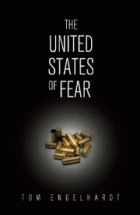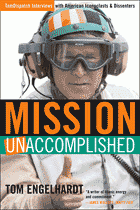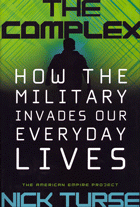[Note for TomDispatch Readers: There’s no way I can thank you enough for your remarkable response to my recent summer appeal for funds to keep TomDispatch rolling along. You are simply the best! If any of you meant to send in a few dollars but forgot, check out our donation page. I’m 73 years old today and still going reasonably strong. That is, I suppose, a miracle of sorts. I’m planning to take the weekend off, so the next TD post will appear on Tuesday, July 25th. In the meantime, I’m expecting TomDispatch to accompany me not just into my 74th year, but my 75th as well thanks to the continuing generosity of all of you! Tom]
Empire of Destruction
Precision Warfare? Don’t Make Me Laugh
By Tom Engelhardt
You remember. It was supposed to be twenty-first-century war, American-style: precise beyond imagining; smart bombs; drones capable of taking out a carefully identified and tracked human being just about anywhere on Earth; special operations raids so pinpoint-accurate that they would represent a triumph of modern military science. Everything “networked.” It was to be a glorious dream of limited destruction combined with unlimited power and success. In reality, it would prove to be a nightmare of the first order.
If you want a single word to summarize American war-making in this last decade and a half, I would suggest rubble. It's been a painfully apt term since September 11, 2001. In addition, to catch the essence of such war in this century, two new words might be useful: rubblize and rubblization. Let me explain what I mean.
In recent weeks, another major city in Iraq has officially been “liberated” (almost) from the militants of the Islamic State. However, the results of the U.S.-backed Iraqi military campaign to retake Mosul, that country’s second largest city, don’t fit any ordinary definition of triumph or victory. It began in October 2016 and, at nine months and counting, has been longer than the World War II battle of Stalingrad. Week after week, in street to street fighting, with U.S. airstrikes repeatedly called in on neighborhoods still filled with terrified Mosulites, unknown but potentially staggering numbers of civilians have died. More than a million people -- yes, you read that figure correctly -- were uprooted from their homes and major portions of the Western half of the city they fled, including its ancient historic sections, have been turned into rubble.
This should be the definition of victory as defeat, success as disaster. It’s also a pattern. It’s been the essential story of the American war on terror since, in the month after the 9/11 attacks, President George W. Bush loosed American air power on Afghanistan. That first air campaign began what has increasingly come to look like the full-scale rubblization of significant parts of the Greater Middle East.
By not simply going after the crew who committed those attacks but deciding to take down the Taliban, occupy Afghanistan, and in 2003, invade Iraq, Bush's administration opened the proverbial can of worms in that vast region. An imperial urge to overthrow Iraqi ruler Saddam Hussein, who had once been Washington’s guy in the Middle East only to become its mortal enemy (and who had nothing whatsoever to do with 9/11), proved one of the fatal miscalculations of the imperial era.
So, too, did the deeply engrained fantasy of Bush administration officials that they controlled a high-tech, precision military that could project power in ways no other nation on the planet or in history ever had; a military that would be, in the president’s words, “the greatest force for human liberation the world has ever known.” With Iraq occupied and garrisoned (Korea-style) for generations to come, his top officials assumed that they would take down fundamentalist Iran (sound familiar?) and other hostile regimes in the region, creating a Pax Americana there. (Hence, the particular irony of the present Iranian ascendancy in Iraq.) In the pursuit of such fantasies of global power, the Bush administration, in effect, punched a devastating hole in the oil heartlands of the Middle East. In the pungent imagery of Abu Mussa, head of the Arab League at the time, the U.S. chose to drive straight through “the gates of hell.”
If you’re looking for fairy tales that are on the grim (not Grimm) side, things that once might only have been in dystopian fiction, look no further than our present planet at our present moment. What about, for instance, that trillion-metric-ton iceberg -- yes, “trillion” is not a misprint -- that broke loose last week from the Antarctic Peninsula and just floated away. It was larger than the state of Delaware, capable of filling an estimated 462 million Olympic-sized swimming pools, its volume twice that of Lake Erie. If you want to think in movie terms, then consider this eerie event a trailer for the main feature on its way to screens globally. If significant parts of Antarctica destabilize in the future, you can expect movie titles (given rising sea levels) like So Long, Miami; Zai Jian Shanghai; Ta-ta London; Dag Amsterdam.
Honestly, we’re now in a fairy tale world, if by modern fairy tale you happen to mean Game of Thrones after not “winter” but “summer” comes to Westeros. So in the week after Antarctica changed its shape perceptibly, it seems appropriate to turn to TomDispatch regular John Feffer, our expert in global dystopian futures and author of the novel Splinterlands, which we recently published in our new book line. Today, in a rare TD plunge into fiction, he offers a fairy tale from 2050 (the year in which Splinterlands is set). His “Grimm” sister is Rachel Leopold, the wife of famed “geo-paleontologist” Julian West. (They have both appeared at TomDispatch before.) In 2020, he was the one who so presciently predicted the way a rising tide of nationalism led by right-wing populists like our own president, when combined with climate change and other factors, would splinter the international order and create a new, ever more desperate world. With that in mind, let me just mutter, “Once upon a time, in 2017...” Now, close your eyes and imagine the unimaginable, because soon enough that will be our world. Tom
A Fairy Tale from 2050
Donald Trump and the Triumph of Anti-Politics
By John FefferOnce upon a time, long, long ago, I testified before the great assembly of our land.
When I describe this event to children today, it really does sound to them like a fairy tale. Once upon a time -- a time before the world splintered into a million pieces and America became its current disunited states -- this old woman was a young idealist who tried to persuade our mighty Congress that a monster was stalking the land.
“Did they listen to you, Auntie Rachel?” they typically ask me.
“Oh, they listened to me, but they didn’t hear me.”
“So, what did you do?”
“I thought and I thought, and I wrote and I wrote, and I put together an even better presentation,” I say patiently. “I had to somehow make that monster visible so those mighty people could see it.”
“What did it look like, Auntie Rachel?”
“It was invisible, my dear children, but we could feel its hot breath. And we could see the terrible things that it did. It could make the oceans rise. It could make the crops wilt in the fields. Still, we kept feeding this terrible beast.”
“But why?”
[Note for TomDispatch Readers: In September, Dispatch Books will publish the next in our line-up of explorations of imperial America: Alfred McCoy’s remarkable In the Shadows of the American Century. Kirkus Reviews has praised it as “sobering reading for geopolitics mavens and Risk aficionados alike, offering no likely path beyond decline and fall.” Among the impressive range of comments we’ve gotten on it come two from Pulitzer Prize winners. Novelist Viet Thanh Nguyen, author of The Sympathizer, writes that McCoy “persuasively argues for the inevitable decline of the American empire and the rise of China... Let’s hope that Americans will listen to his powerful arguments.” And historian John Dower states that the book "joins the essential short list of scrupulous historical and comparative studies of the United States as an awesome, conflicted, technologically innovative, routinely atrocious, and ultimately hubristic imperial power." As with all his work since the CIA tried to stifle his classic first book, The Politics of Heroin, back in the early 1970s, McCoy's is leading-edge stuff and a must-read, so reserve your copy early by clicking here. Tom]
I was 12. It was 1956. I lived in New York City and was a youthful history buff. (I should have kept my collection of American Heritage magazines!) Undoubtedly, I was also some kind of classic nerd. In any case, at some point during the Suez crisis of that year, I can remember going to the U.N. by myself and sitting in the gallery of the General Assembly, where I undoubtedly heard imperial Britain denounced for its attempt to retake the Suez Canal (in league with the French and Israelis). I must admit that it was a moment in my life I had totally forgotten about until historian Alfred McCoy, whose new Dispatch Book, In the Shadows of the American Century: The Rise and Decline of U.S. Global Power, is due out in September, brought it to mind again. And I certainly hadn’t imagined that Suez might have any applicability to this moment. But almost 16 years after this country’s disastrous “war on terror” was launched and with yet another major Middle Eastern city in rubble, we are undoubtedly witnessing a change in the balance (or imbalance) of power on this unruly planet of ours -- and who better to make sense of it than historian McCoy?
Think of him as a modern Edward Gibbon, writing in the twenty-first century on the decline and fall of a great empire. However, unlike Gibbon, who wrote his classic book on Rome centuries after its empire had disappeared from the face of the earth, McCoy has no choice but to deal with American decline contemporaneously -- in, that is, the very act of its happening.
I had a canny friend who assured me a couple of decades ago that when European countries finally started saying no to Washington, I’d have a signal that I was on another planet. So we must now be on Mars. I was struck, for instance, by a recent piece in the Guardian describing the G20 summit as “the ‘G1’ versus the ‘G19.’” In other words, it's increasingly Donald Trump’s Washington against the world, which is the definition of how not to make an empire work. Since imperial decline may, in fact, have been a significant factor in bringing Donald Trump to power, think of him as both its harbinger and -- as McCoy so vividly describes today -- its architect. Tom
The Demolition of U.S. Global Power
Donald Trump’s Road to Debacle in the Greater Middle East
By Alfred W. McCoyThe superhighway to disaster is already being paved.
From Donald Trump’s first days in office, news of the damage to America’s international stature has come hard and fast. As if guided by some malign design, the new president seemed to identify the key pillars that have supported U.S. global power for the past 70 years and set out to topple each of them in turn. By degrading NATO, alienating Asian allies, cancelling trade treaties, and slashing critical scientific research, the Trump White House is already in the process of demolishing the delicately balanced architecture that has sustained Washington’s world leadership since the end of World War II. However unwittingly, Trump is ensuring the accelerated collapse of American global hegemony.
[Note for TomDispatch Readers: If you’re already a TD subscriber, then yesterday you got my biannual email importuning you for money (my least favorite part of the TomDispatch year and undoubtedly yours, too). But since this site doesn’t take advertising and doesn’t have a secret stream of funds, you’re the ones who really do keep it going. So a million thanks to those of you who have already sent in contributions! As for those of you who are regular readers but don’t get our pieces by email, take just a moment, if you can, to read my message and consider donating by clicking here. Much appreciated. Tom]
My childhood was a nuclear one and I’m not talking about the nuclear family. I’m thinking of those duck-and-cover moments when, with air raid sirens screaming outside, we went under our school desks, hands over head, to test out our readiness for a Cold War nuclear exchange and the coming of the end of the world. Even at that young age, I suspect, we understood just how pathetic those desks and our hands were as defenses against an atomic blast, but that mattered little. It was so in the spirit of the era -- and not just when it came to children either.
I’ve never, for instance, forgotten an illustration from Paul Boyer’s classic book, By the Bomb’s Early Light, on the American nuclear fallout (of a cultural sort) that followed the atomic bombings of Hiroshima and Nagasaki as World War II ended and the subsequent Cold War nuclear arms race began. Boyer found that illustration in How to Survive an Atomic Bomb, a 1950 book that caught the spirit of its moment. It showed a natty-looking man wearing one of the signature fedoras of that time, its brim partially over his eyes. The caption for it went: “If you are caught outdoors in a sudden attack, a hat will give you at least some protection from the ‘heat flash.’” Women were similarly urged to wear stockings and long-sleeved dresses just in case their day happened to be interrupted by a Russian nuclear strike.
Think of these as 1950s fashion tips for the apocalypse as American fears of a nuclear conflagration grew in those years. As a Federal Civil Defense Agency pamphlet of the time typically suggested, if a nuclear blast occurred, you could “jump in any handy ditch or gutter... drop flat on ground or floor... to lessen the chances of being struck by falling and flying objects, flatten out at the base of a wall, or at the bottom of a bank.” Or you could simply “bury your face in your arms.” Whatever you did, however, the one thing you weren’t to do, the agency suggested, was “lose your head” -- and whatever bureaucrat offered that pungent advice undoubtedly didn't mean it literally.
In those years, when it came to the apocalypse, you might say that this country did indeed lose its head. One witness to that was retired Air Force lieutenant colonel and TomDispatch regular William Astore. He spent significant parts of his military career in the late 1980s locked inside a mountain (so much better than a ditch or gutter if you were seriously thinking about making it through the end of life as we knew it). He’s never forgotten his professional experience of the nuclear mindset in this country and, in a later lockdown moment filled with rising apocalyptic fears, he naturally finds himself thinking about it again.
One small note, however, on Americans and doomsday: when it comes to the apocalypse, we turn out not to be equal-opportunity employers. Against nuclear war and the apocalyptic terror attacks of our national fantasy life, we’ve been all too ready to lock ourselves down over the years in stunning ways. Against another potential kind of apocalypse, however, we’re not even willing to take the simplest actions. Quite the opposite, when it comes to climate change -- what we used to call “the weather” and now “extreme weather” -- our new president and his crew are unlocking doors everywhere and welcoming doomsday to take up residence in our land, our streets, our houses. Tom
Preparing for Doomsday
A Shelter-in-Place Mentality Is the New American Normal
By William J. AstoreHas there ever been a nation as dedicated to preparing for doomsday as the United States? If that’s a thought that hasn’t crossed your mind, maybe it’s because you didn’t spend part of your life inside Cheyenne Mountain. That's a tale I’ll get to soon, but first let me mention America’s “doomsday planes.”
Dystopian, yes. Unimaginable, no. In fact, a version of our present moment was imagined more than eight decades ago by novelist Sinclair Lewis who wrote a still readable (if now fictionally clunky) novel, It Can’t Happen Here. Its focus: the election as president of a man we might today call a right-wing “populist,” but who, in the context of the 1930s, was simply an American fascist. Lewis gave him the fabulous name Berzelius “Buzz” Windrip and, unlike our president of the moment, he wasn’t a billionaire from New York but a politician from the Midwest.
As we all know, fascism didn’t come to America in the 1930s. Still, in his instant bestseller, Lewis caught the essence of an American tendency that hasn’t left us. And if you read his book now, you can’t help but be struck by certain passages that have the eerie ring not of 1935 but of 2017. Take Lewis’ description of the journalistic Svengali, Lee Sarason (think: Steve Bannon), who wrote his fictional president’s single famous book: “Though he probably based it on notes dictated by Windrip -- himself no fool in the matter of fictional imagination -- Sarason had certainly done the actual writing of Windrip’s lone book, the Bible of his followers, part biography, part economic program, and part plain exhibitionistic boasting, called Zero Hour -- Over the Top.”
Exhibitionist boasting? Sound faintly familiar? Or take this passage about a U.S. Army major general who leads a militaristic show of support for Windrip at the political convention that nominates him: “Not in all the memory of the older reporters had a soldier on active service ever appeared as a public political agitator.” Though Michael Flynn (the “lock her up” guy) was a retired lieutenant general when he strutted his stuff at the 2016 Republican convention, doesn’t it sound uncannily familiar? Or to pick another example, at one point in Windrip’s ever more authoritarian presidency, the book’s protagonist, journalist Doremus Jessup, has these thoughts, which have a distinctly Trumpian feel to them: “He simply did not believe that this comic tyranny could endure. It can’t happen here, said even Doremus -- even now.” Admittedly, the ability to tweet was still 70 years away, but comic nightmare, dystopian revelry, a nation slipping further into a militarized state of autocracy?
These days, all of us, it seems, are Doremus Jessups, facing both the increasingly grim and bizarrely comic aspects of the Trump era and all of us have to deal with them in our own lives in our own ways. With that in mind, we’ve turned to TomDispatch regular Frida Berrigan (and her children) for both inspiration and a striking meditation on the dystopian world of Donald Trump and how to face it. Tom
Growing My Way Out of Dystopia
Can We Stop Feeling Quite So Helpless and Hopeless in a World on the Skids?
By Frida BerriganIn the wake of Donald Trump’s inauguration, George Orwell’s 1984 soared onto bestseller lists, as did Sinclair Lewis’s It Can’t Happen Here and Margaret Atwood’s The Handmaid’s Tale, which also hit TV screens in a storm of publicity. Zombies, fascists, and predators of every sort are now stalking the American imagination in ever-greater numbers and no wonder, given that guy in the Oval Office. Certainly, 2017 is already offering up a bumper crop of dystopian possibilities and we’ve only reached July. But let me admit one thing: the grim national mood and the dark clouds crowding our skies have actually nudged me in a remarkably positive direction. Surprise of all surprises, Donald Trump is making the corn grow in Connecticut!
Maybe I'd better explain.





















